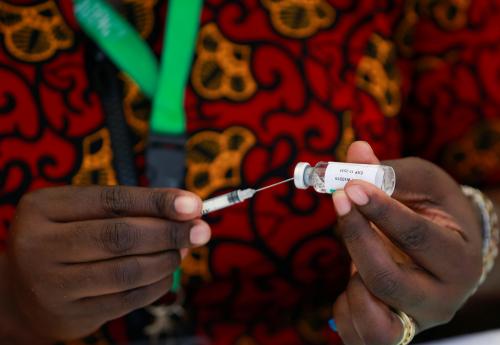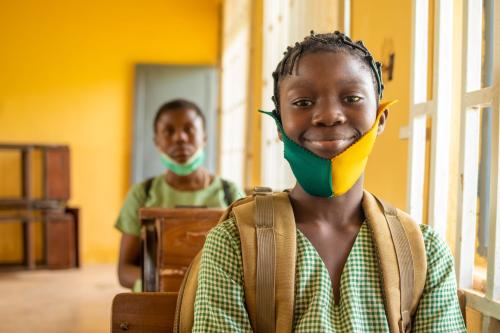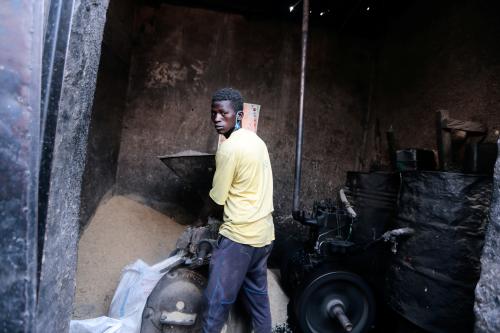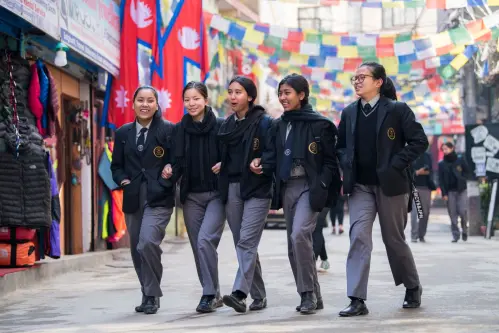Nigeria’s ambitious poverty-reduction targets hinge on developing human capital. Many of the drivers of poverty are considered in detail in a new report, “A Better Future for All Nigerians: Nigeria Poverty Assessment 2022.” Health, nutrition, and education are among the most critical for building human capital.
Even prior to COVID-19, Nigeria had some of the worst human capital outcomes in the world. According to the 2020 Human Capital Index (HCI)—based on a range of markers of health and education including infant mortality, expected years of schooling, sand stunting—a child born in Nigeria that year will grow up to achieve just 36 percent of the productivity he or she could have attained with full health and education. This was below the average for sub-Saharan Africa of around 40 percent. Just six countries had lower HCI scores globally.
Relatedly, learning poverty, which captures 10-year-olds’ ability to understand simple sentences or perform basic numeracy tasks, likely proliferated during the pandemic. While learning poverty cannot be estimated directly for Nigeria due to lack of data, it now affects up to 70 percent of children in low- and middle-income countries.
The direct health effects of COVID-19 itself threaten Nigeria’s human capital. The country recorded its first case of COVID-19 on February 27, 2020 and has subsequently already suffered at least four distinct waves of infection, peaking around June 2020, January 2021, August 2021, and January 2022. However, recorded case numbers in Nigeria generally remained lower than in the Americas, Europe, and Asia.
Yet COVID-19’s impact on the delivery of health and education services could have more profound long-term consequences for Nigeria’s human capital development. On the health side, lockdown measures could have prevented or discouraged patients from attending health facilities and the pandemic may have displaced other health services. Direct evidence on service utilization suggests that outpatient consultations and child vaccinations against other diseases suffered during the pandemic. High-frequency data collected throughout the pandemic through the Nigeria COVID-19 National Longitudinal Phone Survey (NLPS) reinforce this message, showing—for example—that in July 2020, around 21 percent of households with children 0-5 years old who needed or were due for immunizations could not get their children vaccinated.
The COVID-19 crisis threatens future generations further through its impact on education. School closures during 2020 reduced children’s attendance rates even after reopening, especially among older children (Figure 1). Dropout was also higher in the households most affected by income shocks, suggesting that households removed children from school in order to support income-generating activities. Using the NLPS data in conjunction with data on the timing of school closures suggests that Nigerian children lost as much as 0.29 learning-adjusted years of schooling, due to both increased dropouts and imperfect mitigation of school shutdowns.

COVID-19 also threatens to widen inequality in learning, as access to remote learning was uneven across households. Young children from non-poor households had better access to remote learning options— through television, computers, and smartphones or tablets—than those from poor households (Figure 2).

As the COVID-19 pandemic abates, rebuilding human capital represents a key immediate policy priority for Nigeria. In part this means expanding vaccination; the broader effects of the COVID-19 crisis on human capital, livelihoods, and welfare can only be addressed if the health threat is under control, and preventative hygiene methods—such as handwashing and masking—can only go so far. In May 2022, only around 13 percent of the Nigerian population had received even one dose of a vaccine against COVID-19. The second phase of the NLPS also suggests that vaccination rates were lower among poorer Nigerians from rural areas, in part because they lack information on how or where to obtain vaccines. Reticence about getting the COVID-19 vaccine may also be proliferating in Nigeria; the country’s vaccination campaign is in a race against vaccine hesitancy.
Recouping the learning losses experienced during the pandemic is also a crucial element of rebuilding human capital. Nigerians themselves favor expanding in-person learning—especially by adding more hours to the school day—to help children catch up. All else equal, encouraging children to come back to school could help. Yet remote options are needed that can actually work for poor households in the event that schools must close again, given ongoing uncertainty around the path of the pandemic. High-tech options cannot reach the poor, so low-tech solutions—including involving parents and teachers through text messages or broadcasting lessons via radio—could be more appropriate.
Moreover, with children—especially from poor households—having fallen behind during the COVID-19 crisis, curricula may need to be adapted to ensure that children can catch up and that learning inequality is not exacerbated. As evidence from previous crises such as the 2005 Pakistan earthquake suggests, overly ambitious curricula could race ahead of the children themselves, causing learning losses to accumulate and compound over time. Indeed, there is growing evidence that Teaching at the Right Level can bolster the kind of catchup and foundational learning that is required by carefully assessing children’s needs and then tailoring teaching accordingly.
Nevertheless, policies to bolster human capital cannot operate in a vacuum; for example, efforts to rebuild Nigeria’s labor market after the COVID-19 crisis will be essential to ensure the skills and talents of young Nigerians can be put to good use. This way, building human capital can also help to foster inclusive growth, accelerate poverty reduction, and create a better future for all Nigerians.
The Brookings Institution is committed to quality, independence, and impact.
We are supported by a diverse array of funders. In line with our values and policies, each Brookings publication represents the sole views of its author(s).








Commentary
COVID-19 and Nigeria’s human capital crisis
June 7, 2022